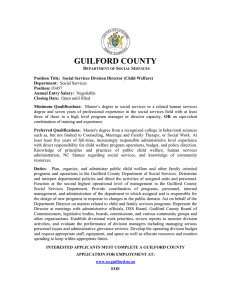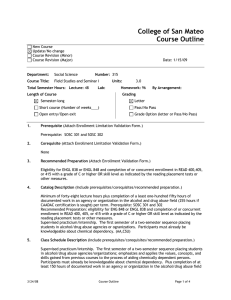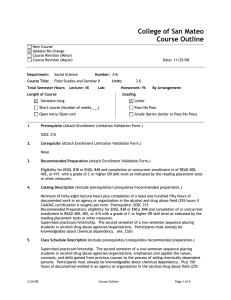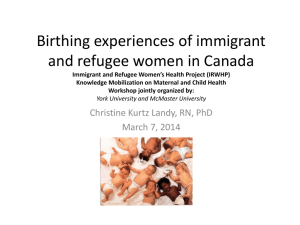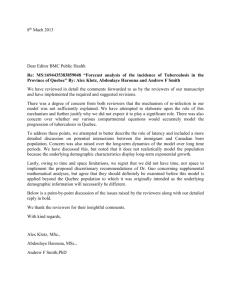UNC-Greensboro Psychology Clinic Involvement Handout
advertisement
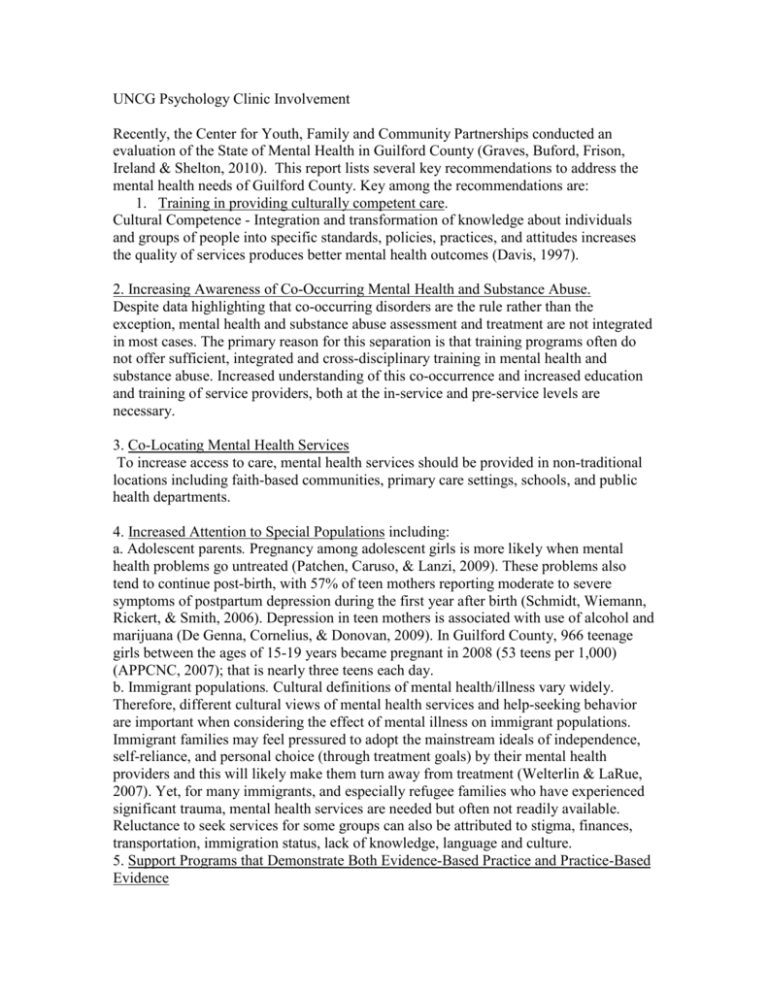
UNCG Psychology Clinic Involvement Recently, the Center for Youth, Family and Community Partnerships conducted an evaluation of the State of Mental Health in Guilford County (Graves, Buford, Frison, Ireland & Shelton, 2010). This report lists several key recommendations to address the mental health needs of Guilford County. Key among the recommendations are: 1. Training in providing culturally competent care. Cultural Competence - Integration and transformation of knowledge about individuals and groups of people into specific standards, policies, practices, and attitudes increases the quality of services produces better mental health outcomes (Davis, 1997). 2. Increasing Awareness of Co-Occurring Mental Health and Substance Abuse. Despite data highlighting that co-occurring disorders are the rule rather than the exception, mental health and substance abuse assessment and treatment are not integrated in most cases. The primary reason for this separation is that training programs often do not offer sufficient, integrated and cross-disciplinary training in mental health and substance abuse. Increased understanding of this co-occurrence and increased education and training of service providers, both at the in-service and pre-service levels are necessary. 3. Co-Locating Mental Health Services To increase access to care, mental health services should be provided in non-traditional locations including faith-based communities, primary care settings, schools, and public health departments. 4. Increased Attention to Special Populations including: a. Adolescent parents. Pregnancy among adolescent girls is more likely when mental health problems go untreated (Patchen, Caruso, & Lanzi, 2009). These problems also tend to continue post-birth, with 57% of teen mothers reporting moderate to severe symptoms of postpartum depression during the first year after birth (Schmidt, Wiemann, Rickert, & Smith, 2006). Depression in teen mothers is associated with use of alcohol and marijuana (De Genna, Cornelius, & Donovan, 2009). In Guilford County, 966 teenage girls between the ages of 15-19 years became pregnant in 2008 (53 teens per 1,000) (APPCNC, 2007); that is nearly three teens each day. b. Immigrant populations. Cultural definitions of mental health/illness vary widely. Therefore, different cultural views of mental health services and help-seeking behavior are important when considering the effect of mental illness on immigrant populations. Immigrant families may feel pressured to adopt the mainstream ideals of independence, self-reliance, and personal choice (through treatment goals) by their mental health providers and this will likely make them turn away from treatment (Welterlin & LaRue, 2007). Yet, for many immigrants, and especially refugee families who have experienced significant trauma, mental health services are needed but often not readily available. Reluctance to seek services for some groups can also be attributed to stigma, finances, transportation, immigration status, lack of knowledge, language and culture. 5. Support Programs that Demonstrate Both Evidence-Based Practice and Practice-Based Evidence The American Psychological Association defines evidence-based practice as “the integration of the best available research with clinical expertise in the context of patient characteristics, culture, and preferences.” The doctoral program in clinical psychology at UNCG prides itself on teaching assessment tools and treatment strategies that are empirically-substantiated, but also applied in a manner consistent with patient characteristics, culture, and preferences. Moreover, the training model of this program is the scientist-practitioner model. Our clinical training is also intended to generate new knowledge and research. 6. Improve Interface of Health and Mental Health The New Freedom Commission on Mental Health Report (2003) and Title V. of the 2010 Healthcare Reform Bill highlights the important interplay between mental health and physical health. Goal 1 in the Commission Report is that in a transformed mental health system there will be an understanding that mental health is essential to overall health.

